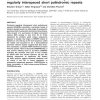Free Online Productivity Tools
i2Speak
i2Symbol
i2OCR
iTex2Img
iWeb2Print
iWeb2Shot
i2Type
iPdf2Split
iPdf2Merge
i2Bopomofo
i2Arabic
i2Style
i2Image
i2PDF
iLatex2Rtf
Sci2ools
113
click to vote
NAR
2007
2007
CRISPRFinder: a web tool to identify clustered regularly interspaced short palindromic repeats
Clustered regularly interspaced short palindromic repeats (CRISPRs) constitute a particular family of tandem repeats found in a wide range of prokaryotic genomes (half of eubacteria and almost all archaea). They consist of a succession of highly conserved regions (DR) varying in size from 23 to 47 bp, separated by similarly sized unique sequences (spacer) of usually viral origin. A CRISPR cluster is flanked on one side by an AT-rich sequence called the leader and assumed to be a transcriptional promoter. Recent studies suggest that this structure represents a putative RNA-interference-based immune system. Here we describe CRISPRFinder, a web service offering tools to (i) detect CRISPRs including the shortest ones (one or two motifs); (ii) define DRs and extract spacers; (iii) get the flanking sequences to determine the leader; (iv) blast spacers against Genbank database and (v) check if the DR is found elsewhere in prokaryotic sequenced genomes. CRISPRFinder is freely accessible at ht...
| Added | 27 Dec 2010 |
| Updated | 27 Dec 2010 |
| Type | Journal |
| Year | 2007 |
| Where | NAR |
| Authors | Ibtissem Grissa, Gilles Vergnaud, Christine Pourcel |
Comments (0)

